Amy Xin
On the Paradoxical Interference between Instruction-Following and Task Solving
Jan 29, 2026Abstract:Instruction following aims to align Large Language Models (LLMs) with human intent by specifying explicit constraints on how tasks should be performed. However, we reveal a counterintuitive phenomenon: instruction following can paradoxically interfere with LLMs' task-solving capability. We propose a metric, SUSTAINSCORE, to quantify the interference of instruction following with task solving. It measures task performance drop after inserting into the instruction a self-evident constraint, which is naturally met by the original successful model output and extracted from it. Experiments on current LLMs in mathematics, multi-hop QA, and code generation show that adding the self-evident constraints leads to substantial performance drops, even for advanced models such as Claude-Sonnet-4.5. We validate the generality of the interference across constraint types and scales. Furthermore, we identify common failure patterns, and by investigating the mechanisms of interference, we observe that failed cases allocate significantly more attention to constraints compared to successful ones. Finally, we use SUSTAINSCORE to conduct an initial investigation into how distinct post-training paradigms affect the interference, presenting empirical observations on current alignment strategies. We will release our code and data to facilitate further research
How does Transformer Learn Implicit Reasoning?
May 29, 2025



Abstract:Recent work suggests that large language models (LLMs) can perform multi-hop reasoning implicitly -- producing correct answers without explicitly verbalizing intermediate steps -- but the underlying mechanisms remain poorly understood. In this paper, we study how such implicit reasoning emerges by training transformers from scratch in a controlled symbolic environment. Our analysis reveals a three-stage developmental trajectory: early memorization, followed by in-distribution generalization, and eventually cross-distribution generalization. We find that training with atomic triples is not necessary but accelerates learning, and that second-hop generalization relies on query-level exposure to specific compositional structures. To interpret these behaviors, we introduce two diagnostic tools: cross-query semantic patching, which identifies semantically reusable intermediate representations, and a cosine-based representational lens, which reveals that successful reasoning correlates with the cosine-base clustering in hidden space. This clustering phenomenon in turn provides a coherent explanation for the behavioral dynamics observed across training, linking representational structure to reasoning capability. These findings provide new insights into the interpretability of implicit multi-hop reasoning in LLMs, helping to clarify how complex reasoning processes unfold internally and offering pathways to enhance the transparency of such models.
AGENTIF: Benchmarking Instruction Following of Large Language Models in Agentic Scenarios
May 22, 2025Abstract:Large Language Models (LLMs) have demonstrated advanced capabilities in real-world agentic applications. Growing research efforts aim to develop LLM-based agents to address practical demands, introducing a new challenge: agentic scenarios often involve lengthy instructions with complex constraints, such as extended system prompts and detailed tool specifications. While adherence to such instructions is crucial for agentic applications, whether LLMs can reliably follow them remains underexplored. In this paper, we introduce AgentIF, the first benchmark for systematically evaluating LLM instruction following ability in agentic scenarios. AgentIF features three key characteristics: (1) Realistic, constructed from 50 real-world agentic applications. (2) Long, averaging 1,723 words with a maximum of 15,630 words. (3) Complex, averaging 11.9 constraints per instruction, covering diverse constraint types, such as tool specifications and condition constraints. To construct AgentIF, we collect 707 human-annotated instructions across 50 agentic tasks from industrial application agents and open-source agentic systems. For each instruction, we annotate the associated constraints and corresponding evaluation metrics, including code-based evaluation, LLM-based evaluation, and hybrid code-LLM evaluation. We use AgentIF to systematically evaluate existing advanced LLMs. We observe that current models generally perform poorly, especially in handling complex constraint structures and tool specifications. We further conduct error analysis and analytical experiments on instruction length and meta constraints, providing some findings about the failure modes of existing LLMs. We have released the code and data to facilitate future research.
AtomR: Atomic Operator-Empowered Large Language Models for Heterogeneous Knowledge Reasoning
Nov 25, 2024



Abstract:Recent advancements in large language models (LLMs) have led to significant improvements in various natural language processing tasks, but it is still challenging for LLMs to perform knowledge-intensive complex question answering due to LLMs' inefficacy in reasoning planning and the hallucination problem. A typical solution is to employ retrieval-augmented generation (RAG) coupled with chain-of-thought (CoT) reasoning, which decomposes complex questions into chain-like sub-questions and applies iterative RAG at each sub-question. However, prior works exhibit sub-optimal reasoning planning and overlook dynamic knowledge retrieval from heterogeneous sources. In this paper, we propose AtomR, a novel heterogeneous knowledge reasoning framework that conducts multi-source reasoning at the atomic level. Drawing inspiration from the graph modeling of knowledge, AtomR leverages large language models (LLMs) to decompose complex questions into combinations of three atomic knowledge operators, significantly enhancing the reasoning process at both the planning and execution stages. We also introduce BlendQA, a novel evaluation benchmark tailored to assess complex heterogeneous knowledge reasoning. Experiments show that AtomR significantly outperforms state-of-the-art baselines across three single-source and two multi-source reasoning benchmarks, with notable performance gains of 9.4% on 2WikiMultihop and 9.5% on BlendQA.
Improving Text Embeddings for Smaller Language Models Using Contrastive Fine-tuning
Aug 02, 2024



Abstract:While Large Language Models show remarkable performance in natural language understanding, their resource-intensive nature makes them less accessible. In contrast, smaller language models such as MiniCPM offer more sustainable scalability, but often underperform without specialized optimization. In this paper, we explore the enhancement of smaller language models through the improvement of their text embeddings. We select three language models, MiniCPM, Phi-2, and Gemma, to conduct contrastive fine-tuning on the NLI dataset. Our results demonstrate that this fine-tuning method enhances the quality of text embeddings for all three models across various benchmarks, with MiniCPM showing the most significant improvements of an average 56.33% performance gain. The contrastive fine-tuning code is publicly available at https://github.com/trapoom555/Language-Model-STS-CFT.
LLMAEL: Large Language Models are Good Context Augmenters for Entity Linking
Jul 04, 2024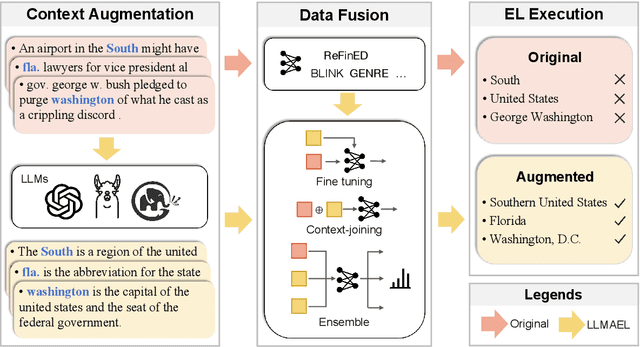
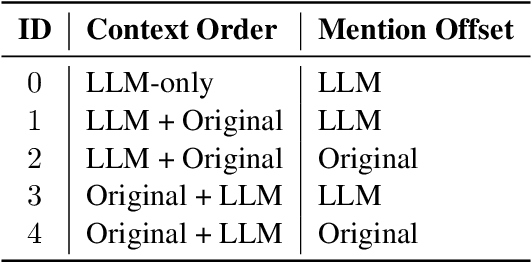
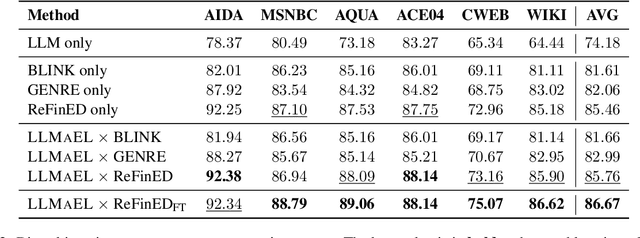
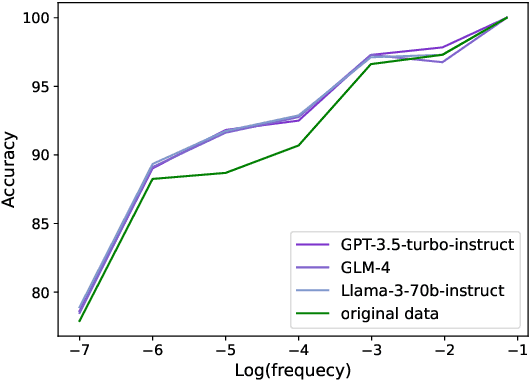
Abstract:Entity Linking (EL) models are well-trained at mapping mentions to their corresponding entities according to a given context. However, EL models struggle to disambiguate long-tail entities due to their limited training data. Meanwhile, large language models (LLMs) are more robust at interpreting uncommon mentions. Yet, due to a lack of specialized training, LLMs suffer at generating correct entity IDs. Furthermore, training an LLM to perform EL is cost-intensive. Building upon these insights, we introduce LLM-Augmented Entity Linking LLMAEL, a plug-and-play approach to enhance entity linking through LLM data augmentation. We leverage LLMs as knowledgeable context augmenters, generating mention-centered descriptions as additional input, while preserving traditional EL models for task specific processing. Experiments on 6 standard datasets show that the vanilla LLMAEL outperforms baseline EL models in most cases, while the fine-tuned LLMAEL set the new state-of-the-art results across all 6 benchmarks.
VisKoP: Visual Knowledge oriented Programming for Interactive Knowledge Base Question Answering
Jul 06, 2023Abstract:We present Visual Knowledge oriented Programming platform (VisKoP), a knowledge base question answering (KBQA) system that integrates human into the loop to edit and debug the knowledge base (KB) queries. VisKoP not only provides a neural program induction module, which converts natural language questions into knowledge oriented program language (KoPL), but also maps KoPL programs into graphical elements. KoPL programs can be edited with simple graphical operators, such as dragging to add knowledge operators and slot filling to designate operator arguments. Moreover, VisKoP provides auto-completion for its knowledge base schema and users can easily debug the KoPL program by checking its intermediate results. To facilitate the practical KBQA on a million-entity-level KB, we design a highly efficient KoPL execution engine for the back-end. Experiment results show that VisKoP is highly efficient and user interaction can fix a large portion of wrong KoPL programs to acquire the correct answer. The VisKoP online demo https://demoviskop.xlore.cn (Stable release of this paper) and https://viskop.xlore.cn (Beta release with new features), highly efficient KoPL engine https://pypi.org/project/kopl-engine, and screencast video https://youtu.be/zAbJtxFPTXo are now publicly available.
KoLA: Carefully Benchmarking World Knowledge of Large Language Models
Jun 15, 2023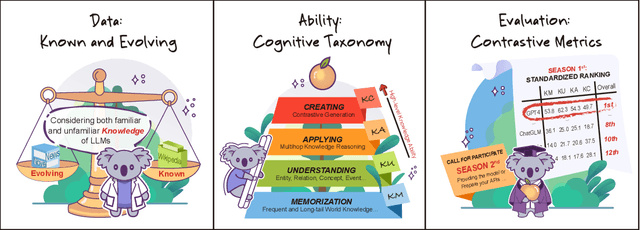
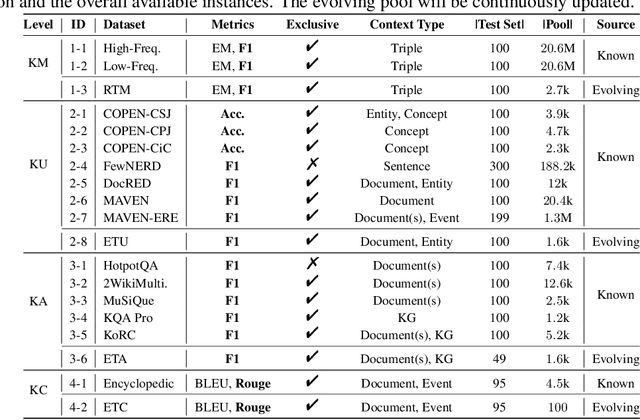
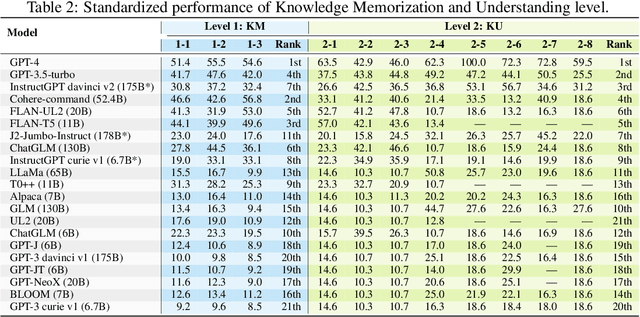

Abstract:The unprecedented performance of large language models (LLMs) necessitates improvements in evaluations. Rather than merely exploring the breadth of LLM abilities, we believe meticulous and thoughtful designs are essential to thorough, unbiased, and applicable evaluations. Given the importance of world knowledge to LLMs, we construct a Knowledge-oriented LLM Assessment benchmark (KoLA), in which we carefully design three crucial factors: (1) For ability modeling, we mimic human cognition to form a four-level taxonomy of knowledge-related abilities, covering $19$ tasks. (2) For data, to ensure fair comparisons, we use both Wikipedia, a corpus prevalently pre-trained by LLMs, along with continuously collected emerging corpora, aiming to evaluate the capacity to handle unseen data and evolving knowledge. (3) For evaluation criteria, we adopt a contrastive system, including overall standard scores for better numerical comparability across tasks and models and a unique self-contrast metric for automatically evaluating knowledge hallucination. We evaluate $21$ open-source and commercial LLMs and obtain some intriguing findings. The KoLA dataset and open-participation leaderboard are publicly released at https://kola.xlore.cn and will be continuously updated to provide references for developing LLMs and knowledge-related systems.
 Add to Chrome
Add to Chrome Add to Firefox
Add to Firefox Add to Edge
Add to Edge